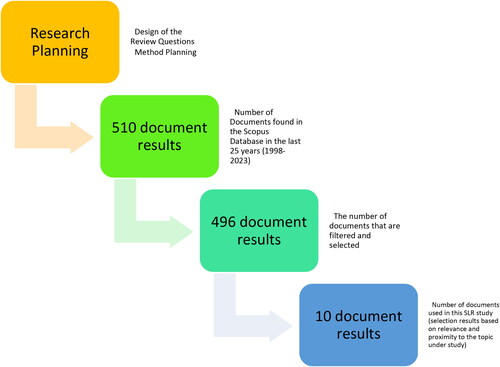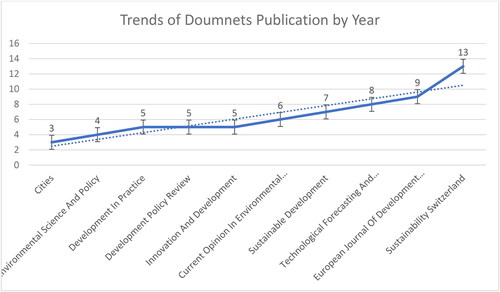Abstract
This systematic literature review aims to identify, review, and study the development of trends in scientific publications regarding inclusive development and policies in overcoming development problems concerning a lack of widespread prosperity that is developing in the world. Our aim is to map recent research and publication activities of authors to identify growing evidence concerning the problem of inclusive development in various regions and how policies support inclusive development. This research provides scientific guidelines and recommendations to develop studies on how policies support inclusive development in various regions. This research can be used as scientific data and policy notes on the issue of inclusive development in encouraging social, economic, and environmental/ecological growth in regional development. The findings of this study evaluate the taxonomy of the literature review through three specific analyses: (1) time analysis, to explore the causes of inclusive development literature trends and policies in dealing with development problems in the last 10 years; (2) terminology analysis, to examine how and where the two failures are related and influence each other; and (3) typology analysis, to investigate whether the ‘Inclusive Development & Policy’ has a positive effect on addressing issues of human development (discrimination), economy, education, equitable development, accessibility, and the environment.
REVIEWING EDITOR:
Introduction
Recently, development tends to be seen in an exclusive development model (Kleibert, Citation2018). Development which only makes aspects of economic growth as the sole goal, which sometimes causes high economic growth without equal distribution of welfare (Kuri, Citation2009; Kleibert, Citation2018). The impacts include high unemployment, high poverty rates, and a widening gini ratio, as well as the carrying capacity of the environment which is continuously degraded as a result of the development process (Kuri, Citation2009; Kleibert, Citation2018). Many groups are excluded from this development model because of several factors, including gender, ethnicity, age, sexual orientation, disability, or poverty.
Inequality of development is clearly the effect of the exclusive development model, this results in a reality where the greatest assets will always only be owned by a small number of people (Van Ardenne, Citation2005; Kuri, Citation2009; Kleibert, Citation2018). According to Van Ardenne (Citation2005), to overcome this problem in exclusive development, efforts are made to encourage a more inclusive development model. In inclusive development it is interpreted that reducing the level of poverty can only be realized if all parties contribute to creating equal opportunities, sharing the benefits of development, and providing the widest possible space for participation in decision making; these efforts are entirely based on respect for the values and principles of human rights. Furthermore, these efforts must be participatory, non-discriminatory, and accountable (Van Ardenne, Citation2005; Goel & Vishnoi, Citation2022; Tadros & Sabates-Wheeler, Citation2020).
The main strategies for inclusive development are the creation of productive and profitable jobs, the provision of an effective and efficient social safety net to protect those who are unable to work or for those who benefit too little from development, basic public services, and adequate public policy support (Rauniyar & Kanbur, Citation2010; Armah et al., Citation2014; Paunov, Citation2013). Inclusive development is viewed as a development of an open economic development model, with full involvement of the roles of various sectors and stakeholders. This model is translated into the form of program interventions including: strategic studies of regional economic potential, development of participatory planning documents and agreements, development of multi-stakeholder forums, advocacy of public policies needed to build an inclusive development climate, and support for small and medium enterprises that are environmentally friendly and impartial in crowds (Rauniyar & Kanbur, Citation2010; Armah et al., Citation2014; Paunov, Citation2013).
In an inclusive development policy, the government must create an effective and efficient governance scheme, formulate appropriate policies, and allocate an adequate budget to provide various public services, including education, health, promote gender equality and social inclusion, develop programs to support small businesses and entrepreneurial growth and development, as well as implementing progressive tax policies. Inclusive development requires the creation of a more just and equal society, creating guarantees that every community has equal opportunities to contribute and benefit from economic growth. Thus, inclusive development policies are expected to reduce poverty, injustice, and social exclusion and create a more independent and sustainable society (Annahar et al., Citation2023; Armah et al., Citation2014).
This article discusses the literature on the Inclusive Development Policy from 1998 to April 9, 2023 which was published in reputable Scopus indexed international journal. At the global level, inclusive development policies are becoming part of an agenda that is relevant in various countries in dealing with the complexity and dynamics of development issues. Global policies encourage the government to open up more equitable opportunities for vulnerable communities to gain economic access through various inclusive development policies. Support for social protection needs to be strengthened, gender equality must be at the top of the agenda, and also encouraging the growth of innovation and technology must be prioritized. Conceptually, inclusive development policies are related to various policy initiatives and government activities to ensure equitable development and economic growth for all levels of society regardless of their social, economic, and cultural backgrounds. This approach believes that efforts to encourage economic growth will not be able to achieve sustainable development goals, the poor and marginalized need to be given adequate access to various available resources (Annahar et al., Citation2023; Armah et al., Citation2014). The purpose of this article is to identify, review, and study the trend of scientific publications regarding inclusive development and policies on inclusive development problems that are easy to study and are developing in the world in the Scopus database. Three specific research questions guide the analysis:
What perspectives and developments are there on the topic of inclusive development?
What reasons are given in the literature for (a) the problem and (b) the solution to the problem?
What actions are considered in the literature to deal with problems in inclusive development that are developing in the world?
This study contributes to the academic debate on policy inclusive development, by focusing especially on inclusive development with policies drawn from the literature with a large number of citations or influence in the Scopus database. Our study identifies several developing countries in Sub-Saharan Africa on inclusive development policy issues in various current literature. So this can be a lesson for various other developing countries in pushing for inclusive development policy issues that are just and sustainable. This article is structured as follows: The next section introduces the research methodology using Search Results Analysis through Scopus and VOSviewer version 1.6.17. Furthermore, 510 articles were found from search results with the keywords ‘Inclusive Development’ AND ‘policy’. Then selected and filtered based on the criteria and relevance of the documents to be described in order to provide insight into the three research questions. Finally, a research agenda will be developed to guide future research.
Methods
This study uses a Systematic Literature Review (SLR) and a Bibliometric Study, which is defined as the process of identifying, assessing, and interpreting all available research evidence with the aim of providing answers to specific research questions (Kitchenham et al., Citation2009; Abdillah et al., Citation2023a; Abdillah et al., Citation2023b). To analyze the data in this SLR study, researchers used analysis results through the Scopus database and the VOSviewer tool (Van Eck & Waltman, Citation2010; Widianingsih et al., Citation2021) with the aim of mapping data.
The research data source was retrieved through the Scopus Database using the keywords ‘Inclusive Development’ AND ‘policy’. Then carry out result reduction (Limited to) to filter appropriate and relevant literature documents. The keyword restriction was conducted through the code “TITLE-ABS-KEY (‘inclusive development’ AND ‘policy’)”. Furthermore, the data obtained is visualized and analyzed through: (1) scopus.com/search/; (2) Chart & SmartArt (in Microsoft Word); and (3) VOSviewer.
The steps and stages of the Systematic Literature Review are divided into 4 stages, namely Planning (designing review questions and planning methods), Data Collection (searching for keywords, screening of titles and abstracts, filtering & assessment, and data extraction), Analysis Stage (descriptive and thematic analysis), then ends with Synthesis (discussion) (McLaren et al., Citation2019; Putera et al., Citation2022; Widianingsih et al., Citation2021). As shown in .
From 1998 to April 9, 2023, a total of 510 studies originating from the Scopus Database and the Google Scholar Database were found (13 documents focused on climate change management for urban resilience in Indonesia, in this literature review study 20 documents were taken), all search results data were stored. in a CSV (Excel) file which is then processed and checked using the VOSviewer program version 1.6.17. VOSviewer is a tool for displaying and analyzing trends in bibliometric maps (Van Eck & Waltman, Citation2010; Abdillah et al., Citation2023a; Abdillah et al., Citation2023b). This program can display and describe bibliometric visual maps with unique data through identification and analysis of the types of analysis that can be visualized in VOSviewer, as shown in :
Figure 2. Types of Bibliometric Analysis Research Data in VOSviewer. Source: Processed from various sources, 2023.
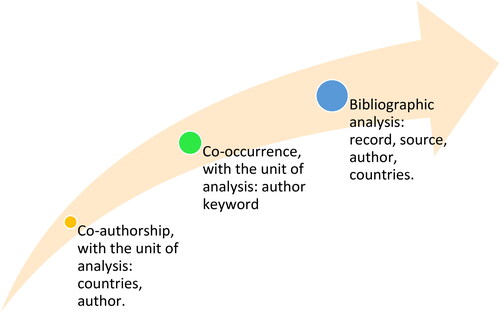
All data used in this study were taken from the Scopus database on April 9, 2023 and other data sources (Google Scholar) were taken on the same date. In exploring the Scopus Database, search using two keywords: ‘inclusive development’ and ‘policy’, which were published from 1998 to April 9, 2023 in the Scopus Database. The search resulted in finding 510 items related to the keywords ‘inclusive development’ and ‘policy’. Then focusing on the keywords TITLE-ABS-KEY (‘inclusive development’ AND ‘policy’) AND (LIMIT-TO (LANGUAGE, ‘English’)), the result is 496 document items. Next, 10 documents with the highest citations and the closest and most relevant to this study were selected to analyze the development of the latest research topics, what are the research problems/gaps, and what can be learned from the development of research topics regarding inclusive development and policies that have been published in the Scopus database.
A bibliometric analysis approach is used to help provide a collection of data that can be utilized by policy makers, academics, and other stakeholders to improve the quality of future research (Hamidah et al., Citation2020; Batini et al., Citation2009; Bano & Zowghi, Citation2015). The bibliometric method is also a comprehensive and reliable way of reviewing and evaluating scientific publications to understand the development of certain research topics (Nafi’ah et al., Citation2021; Batini et al., Citation2009; Bano & Zowghi, Citation2015).
Results – A bibliometric study
In this study we divide into three parts: the first part, we present a bibliometric analysis with 510 documents that we obtained in the Scopus database to see research trends on inclusive development policy research such as annual production trends, trends of the most productive authors publishing the same research topic, countries and affiliates that publish the most articles on the topic of inclusive development and policies, as well as what subject areas and types of documents most often discuss the topic of inclusive development policies; the second part, we explore and analyze the scale and cluster of research topics regarding the virtues of inclusive development that have been published from 1998 to April 2023 in a total of 40 documents, this is useful to see the trend of topics that are most intersecting and most related to the studied policy and inclusive development issues in the Scopus database; and the third part we present a systematic literature review with the 10 documents that are most referenced and most related to the topic of inclusive development policies. In addition, we also share some critical views and highlight some important things in the study of inclusive disposal policies that are developing in the world.
The following is an explanation of the trends and publication results of various world researchers regarding ‘Inclusive Development & Policy’ from 510 documents in the Scopus database from 1998 to April 9, 2023 in the world. As shown in :
Figure 3. Publication trends based on the quantity of documents regarding ‘Inclusive Development & Policy’ in 1998 to April 9, 2023.
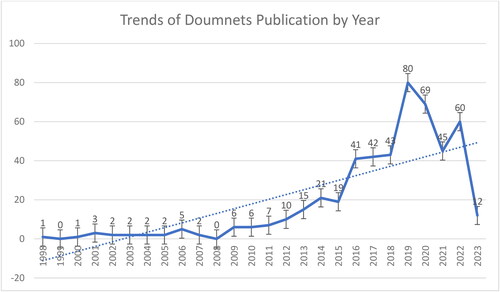
shows publication trends based on the quantity of documents regarding ‘Inclusive Development & Policy’ from 1998 to April 9, 2023 which are experiencing dynamic trends. Where the initial appearance of the topic with the keyword ‘inclusive development’ related to the keyword ‘policy’ in 1998 continued to increase in publications with the same topic until 2019 the most publications was seen in the Scopus database, and in the last three years to be precise in 2020 to 2023, experienced a trend of decreasing publications with topics that was published in the Scopus database. This is influenced by several things such as research interest on the topic of inclusive development and a lack of policy or the problem of difficult access to research and expensive publication costs.
shows the Top 10 Journals based on document sources that published various documents on ‘Inclusive Development & Policy’ from 1998 to April 9, 2023 which are in the Scopus Database. Based on the figure above, sources/journals that publish on the topic/issue ‘Inclusive Development & Policy’ tend to be in the 1st Quartile (Q1) and 2nd Quartile (Q2) in Scopus. Such as: Sustainability (Q1 with 5.8 CiteScore); European Journal Of Development Research (Q2 with 3.5 CiteScore); Technological Forecasting And Social Change (Q1 with 17.2 CiteScore); Sustainable Development (Q1 with 15.2 CiteScore); Current Opinion In Environmental Sustainability (Q1 with 14.1 CiteScore); Innovation And Development (Q1 with 2.4 CiteScore); Development Policy Review (Q2 with 3.1 CiteScore); Development in Practice (Q2 with 2.6 CiteScore); Environmental Science and Policy (Q1 with 10.5 CiteScore); and Cities (Q1 with 10.4 CiteScore).
shows the top 10 Authors who published various documents on ‘Inclusive Development & Policy’ from 1998 to April 9, 2023 which are in the Scopus Database. Based on the data, Asongu, S.A. (30 Documents) as the author who studies and publishes the most frequently on the topic/issue ‘Inclusive Development & Policy’, then Odhiambo (14 documents), Gupta, J. (8 documents) and Nwachukwu, J.C. (6 Documents). These researchers are experts in their fields who have published many articles and these authors have a high degree of influence on Scopus.
Table 1. Top 10 Authors Concerning the Topic ‘Inclusive Development and Policy’.
shows the Top 10 Countries with the quantity of document publication on ‘Inclusive Development & Policy’ from 1998 to April 9, 2023 which is in the Scopus Database. The identification results of the countries that most often study and publish research on ‘Inclusive Development & Policy’ are South Africa (81 documents), UK (71 documents), India (61 documents), The United States (47 documents), Holland (43 documents), China (33 documents), Canada (20 documents), Nigeria (20 documents), Australia (19 documents), and Germany (17). This shows the tendency of various regions in the world, from Africa, Europe, America, UK, Asia, and Australia to concentrate on studying the topic ‘Inclusive Development & Policy’. This indicates that the topic of ‘Inclusive Development & Policy’ is a trending topic studied in various parts of the world.
Figure 5. Top 10 Countries and Affiliates with published documents on ‘Inclusive Development & Policy’.
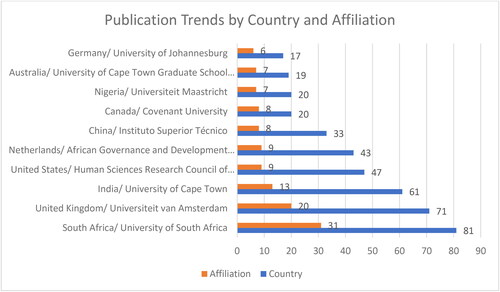
Top 10 Affiliation of Authors in the figure above with the quantity of document publications regarding ‘Inclusive Development & Policy’ from 1998 to April 9, 2023 which are in the Scopus Database. The above shows various universities in the world that concentrate on studying and publishing the topic/issue ‘Inclusive Development & Policy’.
shows the Top 10 Types of Documents with the highest quantity of publications regarding ‘Inclusive Development & Policy’ in 1998-2023 which are in the Scopus Database. The type of article (69%) is the type of document that most often publishes the topic/issue of ‘Inclusive Development & Policy’, there were also Book Chapters (14%), and Reviews (6%). Based on this, there is a tendency for global researchers to publish articles as a research document to be published on Scopus.
Figure 6. Top 10 Types of Documents with the highest quantity of publications regarding ‘Inclusive Development & Policy’.
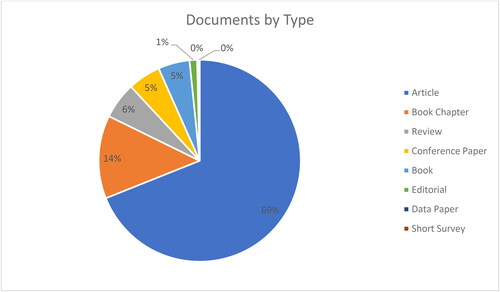
shows the Top 10 Subject Areas with the highest number of publications regarding ‘Inclusive Development & Policy’ from 1998 to April 9, 2023 which are in the Scopus Database. The subject area regarding the topic/issue of ‘Inclusive Development & Policy’ is dominated by Social Sciences (39%), Economics, Econometrics, and Finance (14%), Business, Management, and Accounting (9%), Environmental Science (11%), Engineering (5%), Energy (5%), and Computer Science (4%). Therefore, the development regarding the global ‘Inclusive Development & Policy’ study is close to the problem of Social, Environmental, and Economist-business studies.
Figure 7. Top 10 Subject Areas with the highest number of publications on ‘Inclusive Development & Policy’.
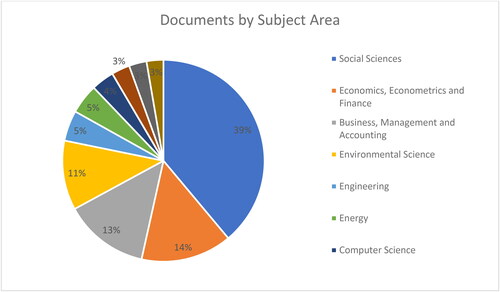
Mapping of research topics related to inclusive development policy research
In this section, we explore and analyze research topic scales and clusters regarding inclusive development policy research, including those that have been published from 1998 to April 2023 a total of 496 documents screening results in the Scopus database. This document filtering is based on the level of accuracy and relevance of documents on this research topic by looking at the article title and abstract (Abdillah et al., Citation2023a; Abdillah et al., Citation2023b). The results of scale and cluster mapping can also be insights for future research interested in studying inclusive development topics/problems.
below shows the results of the identification and analysis of topics/issues regarding ‘Inclusive development & policies’ conducted through VOSviewer.
Figure 8. Identification and analysis of topic issues regarding ‘Inclusive Development & Policy’ that are developing in the world.
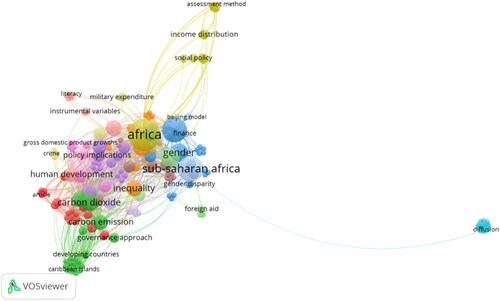
Based on the results of the identification and analysis of ‘Inclusive Development & Policy issues’ content that is developing in the world. Identification was carried out from All Keywords & Abstracts via VOSviewer on as many as 496 documents. We analyzed and identified 496 documents that were explored via Vosviewer using Map based on Bibliographic, then carried out a Co-Occurrence type of analysis. The results show: (1) there are 14 cluster divisions based on discussion of studies conducted and the relationship of issues to one another; (2) the clusters are; (a) The first cluster (red) of study variables on ‘Inclusive Development & Policy’ is seen in africa south of the sahara (sub-saharan africa), education, environmental economics, human experiment, income, legal system, mobile banking, outcome, political system, poverty, quality of growth, religion, socioeconomic conditions, and threshold limit values; (b) The second cluster (green) examines and relates to Asia, carbon dioxide and carbon emission, caribbean islands, developing countries, environmental quality, governance, institutional quality, latin america, natural resources, resource management, synergy effect, and tobit regression (methods); (c) the third cluster (blue) examines and relates to broadband data, economic relations, gender (disparity, relations, role), heterogeneity, inclusive development, information and communication technology (ICT), internet, labor participation, policy analysis (method), social exclusion, social inclusion, and women employment.; (d) the fourth cluster (yellow) examines and deals with china (Beijing) as well as africa, diplomatic relations, econometrics, economic impact, economic policy, gross domestic product, income distribution, insurance system, policy implementation, social policy, socioeconomic status, 21st century; (e) the fifth cluster (purple) studies and deals with carbon dioxide emissions, cellular telephones, environmental pollution, information and communication technology (ICT), laws and legislation, liquid fuels, mobile devices, policy implications, positive correlations, public policy, social sciences, and telephone sets; (f) the sixth cluster (light blue) examines and relates to diffusion, foreign direct investment, global consumption, ICT (Access, diffusion, skills, usage), inclusive growth, international trade, joint effects, and the world bank.; (g) the seventh cluster (orange) examines and relates to comparative study (method), economic analysis, economic sense, employment, women, fixed broadbands, gini coefficients, globalization, inclusive education, income inequality, labor force participation; (h) the eighth cluster (brown) examines and relates to educational policy, educational development, fundamental characteristics, inclusive human development, mobile phones, policy approach (method), quality education, technology adoption, and unobserved heterogeneity; (i) the ninth cluster (pink) examines and relates to economic and social effects, economic development, empirical analysis (method), growth rate, population growth rates, population statistics; (j) the tenth cluster (light orange) examines and relates to the human development index, intellectual property right, literacy, panel data, software piracy; (k) the eleventh cluster (light green) examines and relates to foreign aid, humanitarian aid, international aid, millennium development, regression analysis (method), sustainable development, and synergism; (l) The twelfth cluster (opaque blue) studies and relates to the beijing model, finance, governance, income levels, middle class, sub-saharan africa, washington consensus.; (m) the thirteenth cluster (light yellow) examines and relates to crime, environmental regulations, interactive effects, military expenditure, political stability, quality control, and terrorism; (n) the fourteenth cluster (light purple) studies and relates to co2 emission, environmental degradation and policy, inclusiveness, and the kuznetz curve.
These discoveries led to the creation of research and publications between 1998 and April 9, 2023. There was a rise in studies from many nations, including the United Kingdom and the United States. Additionally, there were published articles and book chapters on the topic of ‘Inclusive Development & Policy’. The research and publications mostly focus on the disciplines of social science and environmental science, encompassing a diverse array of topics, including the ones mentioned before. The research trend has been documented in Scopus, demonstrating the extent of its impact through citations and showcasing the author’s skill in the field of ‘Inclusive Development & Policy’. The latest developments in human development in South Africa encompass various areas including education, health, economic growth, and environmental enhancement. These include addressing issues such as emissions, improving access to information technology, reducing developmental disparities, promoting gender equality, empowering female workers, and combating social exclusion. For visual representation, please refer to in the word cloud, in the Trend Topics, and in the Treemap. Asia and China-Beijing are currently witnessing several research trends. These trends primarily revolve around the study of carbon emissions and their environmental consequences, the development of appropriate governance and legal systems in developing countries, the sustainable management of natural resources, and the utilization of information technology.
Figure 9. (a) The development of trending topic issues regarding “Inclusive Development and Policy” which is currently developing in the world. (b) The development of trending topic issues regarding ‘Inclusive Development and Policy’ which is currently developing in the world. (c) The development of trending topic issues regarding ‘Inclusive Development and Policy’ which is currently developing in the world.
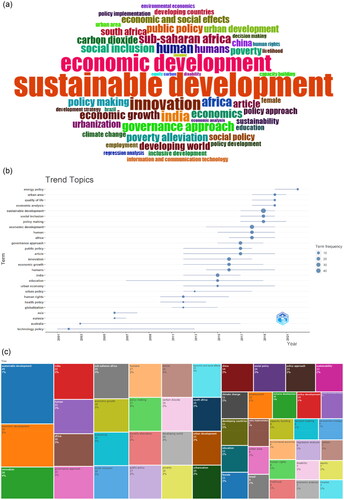
Discussions – systematic literature review
As with the bibliometric analysis carried out previously in Section 1 and Section 2. Our study focuses on developing countries in Sub-Saharan Africa regarding inclusive development policy issues in various recent literature. This is intended to be a lesson for various other developing countries in pushing for inclusive development policy issues that are just and sustainable. Based on the research identification shown in , it can be said that there is still a lack of research discussing the topic ‘Inclusive Development & Policy issues’. There is also a trend of decreasing publications on the same topic in the last three years. Although this topic is very interesting, it has been studied by various researchers who are experts in their fields, such as: (1) Asongu, S.A. from Cameroon; (2) Odhiambo from South Africa.; (3) Gupta, J. from the Netherlands; and (4) Nwachukwu, J.C from the United Kingdom. Some of the most influential research publications on Scopus with the highest level of citation documents on the topic ‘Inclusive Development & Policy’ which are used as references in evaluating and looking for what can be learned from the development of trends in inclusive development knowledge related to policies that are widely referred to by various global researchers, as follows:
Table 2. The results of screening and selecting documents are based on their relevance and closeness to the topic under study regarding ‘Inclusive Development & Policy’.
According to Asongu and Le Roux (Citation2017) identifying the problem of whether improving information and communication technology (ICT) increases inclusive human development in a sample of 49 countries in Africa. In their research findings, they state that policies designed to encourage ICT penetration (mobile, internet, telephone) will promote inclusive development in the post-2015 sustainable development agenda. In other findings, it is also stated that the level of positive inclusive development responses to ICT varies across the fundamental characteristics of human development and ICT dynamics in South Africa. Other research supported these findings, such as the one carried out by Biekpe, N. et al. (2017) who studied environmental degradation, ICT, and inclusive development in Sub-Saharan Africa. The findings in the research broadly indicate that ICTs can be used to mitigate the potential negative impacts of environmental pollution on human development. In Asongu and Nwachukwu (Citation2016), who discussed the role of mobile phone governance for inclusive human development in Sub-Saharan Africa, the problem of how the governance synergy effects on mobile phone penetration for inclusive human development in Sub-Saharan Africa with data for the period 2000–2012 was studied. According to Asongu and Nwachukwu (Citation2016), there is a visible positive relationship between mobile phones and inclusive human development that exists in Sub-Saharan Africa. The social impact of mobile phone products in Sub-Saharan Africa has contributed to innovation and literacy policies as a new technology there. Although political governance is not very significant in the estimation model, the average effect of economic governance is relatively higher than that of institutional governance.
In addition, Nchofoung et al. (Citation2021) also empirically discuss the effect of natural resource rents on inclusive human development in developing countries. In this study, it was found that the results of the Tobit IV regression showed that natural resource rents had a direct positive effect on inclusive human development in developing countries, with relationships that varied based on regional grouping, income level, level of development, and export structure. Singh et al (2021) discuss how inclusive development, military spending, and political stability are involved in the fight against terrorism in 53 African countries for the period of 1998–2012. The results of this study indicate that First, military spending and inclusive development replace each other, not complement each other. Second, it makes more sense to complement inclusive development with political stability than to complement political stability with inclusive development. Third, it can be broadly argued that military spending and political stability go hand in hand.
Other studies such as those conducted by Asongu and Odhiambo (Citation2021b) regarding how income-based governance affects inclusive human development in Sub-Saharan Africa with data for the period of 2000–2012. This research shows that ‘middle income’ driven governance has a higher effect on inclusive human development than ‘low income’ driven governance. In addition, research conducted by Tchamyou et al. (2021) regarding how policy tools are used in the fight against terrorism when a high level of terrorism problems exists in 53 African countries for the period of 1998–2012. military spending and inclusive human development are used as counterterrorism policy measures. Second, political stability has a negative impact on terrorism and has a negative threshold effect. Estimates of political stability are important because of the increasing negative margin of domestic conditions and the distribution of terrorism as a whole. Furthermore, the research conducted by Odhiambo (2020) on foreign aid and inclusive human development in Africa suggest that various patterns inform policy-makers about the relevance of types of sequencing assistance to promote inclusive development. Asongu and Odhiambo’ research (2020) regarding the relevance of government quality in moderating environmental degradation events in inclusive human development in 44 sub-Saharan African countries for the period of 2000–2012. According to the study’s findings, the quality of regulation modifies CO2 emissions in a way that has a net adverse impact on inclusive development. Institutional governance, which entails the suppression of corruption and the application of the law, modifies CO2 emissions and hence has a net detrimental impact on equitable human development. It’s a good thing that the associated interactive impact is positive since it shows that improving good governance is necessary to produce a favorable net effect. There is a policy threshold for institutional governance that determines when institutional governance truly lessens the negative consequences of CO2 emissions on inclusive human development. We also talk about other policy issues. This study discusses the problems of inclusive development policies in developing countries in Sub-Saharan Africa. Therefore, we recommend that future research be carried out in various developing countries in the Southeast Asia region regarding the issue of inclusive development that is just and resilient in light of the various development dilemmas that occur there. To enrich the literature on development policy including various sources.
Critical findings
This bibliometric review can be considered as tracing, identifying, and mapping the trends of developing research issues, identifying dominant authors/researchers studying the same topic, and to what extent the topics of ‘inclusive development’ and ‘policy’ are studied and have implications for the development of science and contribute to solving development problems that are too exclusive which are only concerned with the economic development sector alone. Based on various research findings that have developed in the world, the most frequently cited and referred to are criticisms of inclusive development and policies that are still constrained by community participation, poor social conditions due to crime, and the political dynamics of a region or country (Armah et al., Citation2014; Asongu & Odhiambo, Citation2021b; Asongu et al., Citation2021a; Asongu et al., Citation2021b).
Policy, theoretical, and practical implications
In this article, we have explored knowledge development and research activities related to what problems are more frequently researched, what findings have been concluded, and what can be learned from inclusive development related policies in various worlds such as the problem of inclusive development in South Africa, United States, Canada, India, and in Australia. This literature review study shows research themes, research perspectives, and changes in research methods from time to time. The use of VOSviewer software to plot keyword co-occurrence can assist scholars in gaining insight into how various authors of the world address inclusive development issues with policy. The trend of studies regarding this topic shows that the problem of inclusive development include education, health, economic growth, and environmental improvement from emissions, to easy access to information technology, overcoming development disparity issues, gender, women workers, and social exclusion. This paper provides a graphical representation of previous research findings for evidence-based practitioners and knowledge mapping on the issue of inclusive development in various parts of the world. Therefore, the practical implications of this research to address the problem of inclusive development in various countries in the world shows a need to encourage policy support at every level from the national level to the community level in reasonable political dynamics, and in an accountable and efficient governance scheme.
Future research should consider intersecting thematic areas such as coercive control, technology, and unprecedented political-economic-environmental disasters. The conceptual-theoretical literature has been thoroughly explored and given the complexity of the issues directly intersecting both in a large or small scale, the researcher should consider updating the current publications with innovative and systematic methods that further expand on this research, for example utilizing various other databases. Equally important is increasing research products that integrate the latest issues as well as contextual subject areas to deal with the problem of proper inclusive development, and generate the needed new insights.
Conclusions
Literature exploration on ‘Inclusive Development & Policy’ from 1998 to April 9, 2023 which is in the Scopus Database. This study evaluates the taxonomy of literature review through three specific analyses: (1) time analysis, to explore the causes of inclusive development literature trends and policies in dealing with development problems in the last 25 years; (2) terminology analysis, to examine how and where the two failures are related and influence each other; and (3) typology analysis, to investigate whether the ‘Inclusive Development & Policy’ has a positive effect on addressing issues of human development (discrimination), economy, education, equitable development, accessibility, and the environment.
The findings in this systematic literature review show that research and publications from 1998 to April 9, 2023 have been produced from various countries such as the UK and United States, and also by publishing articles and book chapters regarding ‘Inclusive Development & Policy’. The research and publications tend to be in the subject areas of social science and environmental science which study various issues such as those in the several clusters above. Where the trend of research has been published in Scopus which has a large level of influence (citations) and the author’s expertise regarding ‘Inclusive Development & Policy’. The latest trends can be seen in the issue of human development in South Africa regarding issues of education, health, economic growth, and environmental improvement from emissions, to easy access to information technology, overcoming developmental disparities, gender, female workers, and social exclusion. There are several research trends conducted in Asia and China-Beijing to Latin America which concentrate on studying the issue of carbon emissions that have an impact on environmental damage, developing countries with appropriate governance and legal systems, managing natural resources in moderation, to the utilization IT. Despite the various findings in this research, over the last three years the topic of ‘Inclusive Development & Policy’ has decreased. And several research issues that still need to be studied in the issue of inclusive development such as the low quality of human resources, low labor productivity, improvement of living standards, inclusive economic development policy framework, and equitable economic development. Criticism of inclusive development and policies is still constrained by the size of community participation, poor social conditions due to crime, and the political dynamics of a region or country.
Limitations of the study
This research is limited in identifying trends and evaluating the development of the topic of ‘Inclusive Development & Policy issues’ in the period 1998 to April 9, 2023 which relies on secondary data from the Scopus database. It is still possible that databases like Web of Science and Google Scholar, Pudmed, Dimensions database publish the same topic. Therefore, the amount regarding research on inclusive development can be more than what was found in this study.
Authors’ contributions
Conceptualization, I.W., A.A., Q.M.A.; Supervision, I.W.; methodology, software, machine learning, and prediction, I.W., and A.A.; data curation, Investigation, writing—original draft preparation. I.W., A.A., and Q.M.A.; writing—review and editing I.W., A.A., Q.M.A. All authors have read and agreed to the published version of the manuscript.
Disclosure statement
No potential conflict of interest was reported by the authors.
Data availability statement
The results of the study can be found in the figures attached in the article. The data set used to support the findings of this study is available from the corresponding author upon request.
Additional information
Funding
References
- Abdillah, A., Buchari, R. A., Widianingsih, I., & Nurasa, H. (2023b). Climate change governance for urban resilience for Indonesia: A systematic literature review. Cogent Social Sciences, 9(1), 1. https://doi.org/10.1080/23311886.2023.2235170
- Abdillah, A., Widianingsih, I., Buchari, R. A., & Nurasa, H. (2023a). Implications of urban farming on urban resilience in Indonesia: Systematic literature review and research identification. Cogent Food & Agriculture, 9(1), 2216484. https://doi.org/10.1080/23311932.2023.2216484
- Annahar, N., Widianingsih, I., Paskarina, C., & Muhtar, E. A. (2023). A bibliometric review of inclusive governance concept. Cogent Social Sciences, 9(1), 2168839. https://doi.org/10.1080/23311886.2023.2168839
- Armah, B., Keita, M., Gueye, A., Bosco, V., Ameso, J., & Chinzara, Z. (2014). Structural transformation for inclusive development in Africa: The role of active government policies. Development, 57(3-4), 438–16. https://doi.org/10.1057/dev.2015.9
- Asongu, S. A., & Le Roux, S. (2017). Enhancing ICT for inclusive human development in Sub-Saharan Africa. Technological Forecasting and Social Change, 118, 44–54. https://doi.org/10.1016/j.techfore.2017.01.026
- Asongu, S. A., & Nwachukwu, J. C. (2016). The role of governance in mobile phones for inclusive human development in Sub-Saharan Africa. Technovation, 55-56, 1–13. https://doi.org/10.1016/j.technovation.2016.04.002
- Asongu, S. A., & Odhiambo, N. M. (2020a). Foreign aid complementarities and inclusive human development in Africa. Journal of Social Service Research, 46(5), 623–641. https://doi.org/10.1080/01488376.2019.1612821
- Asongu, S. A., & Odhiambo, N. M. (2020b). Governance, CO2 emissions and inclusive human development in sub-Saharan Africa. Energy Exploration & Exploitation, 38(1), 18–36. https://doi.org/10.1177/0144598719835594
- Asongu, S. A., & Odhiambo, N. M. (2021a). Finance, governance and inclusive education in Sub-Saharan Africa. Social Responsibility Journal, 17(8), 1044–1061. https://doi.org/10.1108/SRJ-02-2020-0039
- Asongu, S. A., & Odhiambo, N. M. (2021b). Income levels, governance and inclusive human development in Sub-Saharan Africa. Applied Research in Quality of Life, 16(1), 71–103. https://doi.org/10.1007/s11482-019-09755-8
- Asongu, S. A., Le Roux, S., & Biekpe, N. (2017). Environmental degradation, ICT and inclusive development in Sub-Saharan Africa. Energy Policy, 111, 353–361. https://doi.org/10.1016/j.enpol.2017.09.049
- Asongu, S. A., Le Roux, S., & Singh, P. (2021a). Fighting terrorism in Africa: Complementarity between inclusive development, military expenditure and political stability. Journal of Policy Modeling, 43(5), 897–922. https://doi.org/10.1016/j.jpolmod.2020.01.014
- Asongu, S. A., Tchamyou, V. S., Asongu, N., & Tchamyou, N. P. (2021b). Fighting terrorism in Africa when existing terrorism levels matter. Behavioral Sciences of Terrorism and Political Aggression, 13(1), 1–22. https://doi.org/10.1080/19434472.2019.1698634
- Bano, M., & Zowghi, D. (2015). A systematic review on the relationship between user involvement and system success. Information and Software Technology, 58, 148–169. https://doi.org/10.1016/j.infsof.2014.06.011
- Batini, C., Cappiello, C., Francalanci, C., & Maurino, A. (2009). Methodologies for data quality assessment and improvement. ACM Computing Surveys, 41(3), 1–52. https://doi.org/10.1145/1541880.1541883
- Goel, R. K., & Vishnoi, S. (2022). Urbanization and sustainable development for inclusiveness using ICTs. Telecommunications Policy, 46(6), 102311. https://doi.org/10.1016/j.telpol.2022.102311
- Hamidah, I., Sriyono, S., & Hudha, M. N. (2020). A bibliometric analysis of Covid-19 research using VOSviewer. Indonesian Journal of Science and Technology, 5(2), 209–216. https://doi.org/10.17509/ijost.v5i2.24522
- Kitchenham, B., Brereton, O. P., Budgen, D., Turner, M., Bailey, J., & Linkman, S. (2009). Systematic literature reviews in software engineering–a systematic literature review. Information and Software Technology, 51(1), 7–15. https://doi.org/10.1016/j.infsof.2008.09.009
- Kleibert, J. M. (2018). Exclusive development (s): Special economic zones and enclave urbanism in the Philippines. Critical Sociology, 44(3), 471–485. https://doi.org/10.1177/0896920517698538
- Kuri, P. K. (2009). Inclusive and exclusive development in India in the post-reform era. In The politics of social exclusion in India (pp. 86–100). Routledge. https://doi.org/10.4324/9780203864241-8
- McLaren, H., Star, C., & Widianingsih, I. (2019). Indonesian women in public service leadership: A rapid review. Social Sciences, 8(11), 308. https://doi.org/10.3390/socsci8110308
- Nafi’ah, B. A., Roziqin, A., Suhermanto, D. F., & Fajrina, A. N. (2021). The Policy Studies journal: A Bibliometric and mapping study from 20152020. Library Philosophy and Practice, 2021, 1–18. https://digitalcommons.unl.edu/libphilprac/5881/
- Nchofoung, T. N., Achuo, E. D., & Asongu, S. A. (2021). Resource rents and inclusive human development in developing countries. Resources Policy, 74, 102382. https://doi.org/10.1016/j.resourpol.2021.102382
- Paunov, C. (2013). Innovation and inclusive development: A discussion of the main policy issues. Organisation for Economic Cooperation and Development (OECD), 62, 18151965. https://doi.org/10.1787/18151965
- Putera, P. B., Suryanto, S., Ningrum, S., Widianingsih, I., & Rianto, Y. (2022). Three decades of discourse on science, technology and innovation in national innovation system: A bibliometric analysis (1990–2020). Cogent Social Sciences, 8(1), 2109854. https://doi.org/10.1080/23311886.2022.2109854
- Rauniyar, G., & Kanbur, R. (2010). Inclusive growth and inclusive development: A review and synthesis of Asian Development Bank literature. Journal of the Asia Pacific Economy, 15(4), 455–469. https://doi.org/10.1080/13547860.2010.517680
- Tadros, M., & Sabates-Wheeler, R. (2020). Inclusive development: Beyond need, not creed. CREID Working Paper 1, UK: Coalition for Religious Equality and Inclusive Development (CREID), Institute of Development Studies (IDS). https://opendocs.ids.ac.uk/opendocs/handle/20.500.12413/15120
- Van Ardenne, A. (2005). From exclusive to inclusive development. Globalisation, Poverty and Conflict: A Critical “Development” Reader, 3–7. https://doi.org/10.1007/1-4020-2858-X_1
- Van Eck, N., & Waltman, L. (2010). Software survey: VOSviewer, a computer program for bibliometric mapping. Scientometrics, 84(2), 523–538. https://doi.org/10.1007/s11192-009-0146-3
- Widianingsih, I., Paskarina, C., Riswanda, R., & Putera, P. B. (2021). Evolutionary study of watershed governance research: A bibliometric analysis. Science & Technology Libraries, 40(4), 416–434. https://doi.org/10.1080/0194262X.2021.1926401

